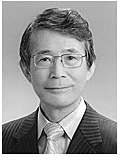| Norio Shiratori |
 @ Dr. Norio Shiratori received his Ph.D. degree in electrical and communication engineering from Tohoku University in 1977. In the same year, he joined the Research Institute of Electrical Communication (RIEC), Tohoku University as a research associate. He became an associate professor at RIEC in 1984, and a professor, Information Engineering, Faculty of Engineering, Tohoku University in 1990. In 1993, he returned to RIEC as a professor. Since 2010, he has been an Emeritus Professor of Tohoku University and a Visiting Professor at RIEC, and an Executive Board Member of Future University Hakodate.
@ Dr. Norio Shiratori received his Ph.D. degree in electrical and communication engineering from Tohoku University in 1977. In the same year, he joined the Research Institute of Electrical Communication (RIEC), Tohoku University as a research associate. He became an associate professor at RIEC in 1984, and a professor, Information Engineering, Faculty of Engineering, Tohoku University in 1990. In 1993, he returned to RIEC as a professor. Since 2010, he has been an Emeritus Professor of Tohoku University and a Visiting Professor at RIEC, and an Executive Board Member of Future University Hakodate.@Dr. Shiratori has been working in the field of information and communications. Specifically, he has pursued 4 areas of research: 1) a knowledge-based design and development support system for information communication systems, 2) Flexible Networks, 3) Symbiotic Computing aimed at achieving harmony between people and computers and a symbiotic relationship between humans and the nature, and 4) the eNever-die Network.f He has been a trailblazer in all of these areas.
@In particular, he proposed a knowledge-based design method, which integrates communication with artificial intelligence, and proved the feasibility of supporting the entire scope of the design process, from protocols to application services on an information network. Three papers describing the results of this work were accepted and were among the 15 papers published in gSpecial Issue: AI in Communication Network,h of IEEE JSAC. These received high worldwide acclaim for being at the forefront of their respective technical areas.
@In 1994, he proposed the concept of a gFlexible Networkh that can dynamically adapt to changes that occur both inside and outside of a network. He succeeded in implementing a flexible network by introducing a gflexible network layerh into the existing network architecture. Later, this flexible network layer came to be called network middleware, and is now firmly established and widely implemented worldwide.
@In the early 1990s, he proposed the concept of Symbiotic Computing, and led researches on ggreen-orientedh information communication systems that are aimed at achieving symbiosis between humans and the nature and at saving energy. In 2011, he successfully conducted demonstration experiments in a project involving a wide-area distributed community (Kurihara Green Project, the Ministry of Internal Affairs and Communications).
@In 2003, he proposed the concept of a gNever-die Network.h He has been pursuing trailblazing research on disaster-resistant information communication systems. This research has intensified since the East Japan Earthquake Disaster on March 11, 2011. His original and farsighted researches have been highly commended both nationally and internationally.
@Dr. Shiratori has led a large number of industry-university collaboration projects funded by the Ministry of Internal Affairs and Communications. In particular, he applied the research results to the next-generation network management. Based on these results, he submitted proposals to IETF and succeeded to make two international standards for Internet.
@Within the IEICE, he contributed to invigorating operations at the Institute and successively served in 5 positions; Chair of the Technical Committee on Information Networks, Chair of the Technical Committee on Artificial Intelligence and Knowledge-Based Processing, Chair of the Technical Committee on Communications Software, Councilor, and Chair of the Tohoku Section. In addition, he made a major contribution to the development of science in the information field by serving as President of the Information Processing Society of Japan, as a representative from Japan in IFIP, Chair of IEEE Sendai Section, as a member of the Science Council of Japan, and as an executive board member of the Japanese Society of Artificial Intelligence.
@ In recognition of these achievements, he has received numerous awards, including a Best Paper Award, an Achievement Award, and a Distinguished Achievement and Contributions Award from the IEICE, an Award from the Japanese Minister of Education, Culture, Sports, Science and Technology, a Best Paper Award and a Distinguished Achievement and Contributions Award from the Information Processing Society of Japan, and a Telecom System Engineering Award from the Telecommunications Advancement Foundation. He has also become a Fellow of the IEICE, IEEE and the Information Processing Society of Japan.
@As mentioned above, his contribution to the development of electronics, information and communications technology through his activities in the IEICE and other relevant engineering societies has been truly outstanding both nationally and internationally. I hereby recommend him as an Honorary Member of the IEICE.